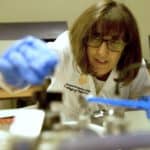
We have the power to make colorectal cancer a thing of the past. The key lies in screening and prevention. Colonoscopy is an effective way to prevent and detect colon cancer at an early stage.
So, why is colorectal cancer the third most common cancer in men and women, and the second-leading cause of cancer-related deaths in the United States? The answer partly is because only about 60 percent of the adults who should be tested for colorectal cancer actually get tested, and partly because of our lifestyle and diet.
Obesity, smoking, red meats, processed meat, high-fat diet, and alcohol increase our chances of colon cancer; exercise, vegetables, fruits and fiber protect from the cancer.
The Best Test for Colon Cancer
The reason why colonoscopy remains the best test for colorectal cancer is because it not only detects the cancer but can prevent it as well. During a colonoscopy, the doctor looks at the entire colon and rectum for polyps that have potential to grow into cancer and removes them.
Who Should Be Screened?
Current guidelines recommend that those without a family history of colon cancer should start screening at age 50. African-Americans should begin screening at age 45 due to higher mortality and incidence. If you have a family history, you may need to start sooner. Talk with your doctor to determine the right age for you.
Some people might avoid screening due to myths, such as, “I have no symptoms, so I don’t need to screen for cancer.” Early colon cancer and colon polyps have no symptoms. When symptoms are present, the cancer tends to be at an advanced stage and has much lower cure rate. Or another one I frequently hear is, “I don’t have a family history, so I will be alright.” Most people who have colon polyps and colon cancer have no family history. Only about 20 percent of the people who have colon cancer have a family history. And a favorite excuse of mine is, “I am a woman, so I won’t get colon cancer.” Colon cancer affects both men and women.
Newer Options
Since the colon and rectum must be cleared out before the colonoscopy procedure, the “prep” process might stop some people from getting this important screening. However, newer kits to clean out the bowel are available and might be more tolerable. Your doctor can discuss the options with you.
If you don’t want to do a colonoscopy, there are other options, including newer stool tests. However, the stool tests are more of a cancer detection tool than prevention tool. Also, if the result from one of these stool tests is positive (abnormal), you’ll still need a colonoscopy to see if you have cancer.
While colorectal cancer incidence and death rates have been on the decline thanks to colonoscopy screening, we still can do better by improving our diet and physical activity, and if everyone who should get screened would actually do so.
—
Dr. Le-Chu Su is a board-certified gastroenterologist at UCF Health’s Lake Nona office. Through her advanced degree in nutrition, she helps her patients implement diet changes to best manage their GI conditions. She specializes in advanced care for patients with IBD.


